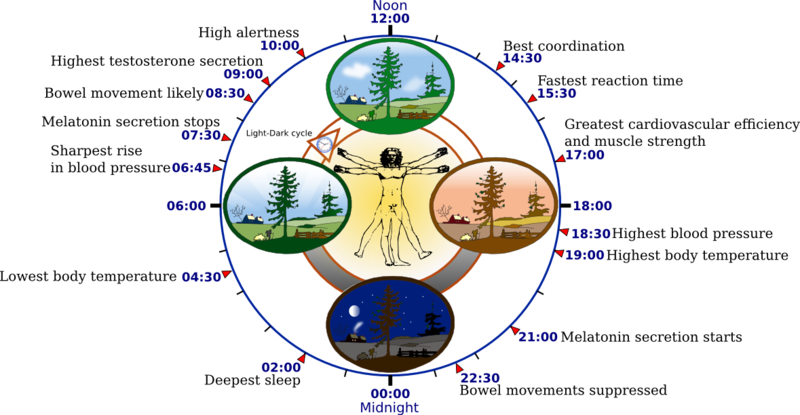Many people make generalizations about the amount of sleep they need each day. I hear many people say, “I only need six hours of sleep”, but there is more to it than just how many hours to sleep for. Someone can sleep for 10 hours and still feel tired. Some say that sleeping too much can cause someone to be tired. The idea here isn’t only about how many hours to sleep for, it’s also about when to sleep.
I won’t try to quantify exactly how much sleep one needs since it differs for each person, but rather explain some of the factors and what people can do in order to optimize their sleeping pattern.
The REM Cycle
During sleep, the body goes through stages of light and deep sleep. Generally speaking, these types are known as rapid eye movement (REM) sleep , and non-rapid eye movement (NREM) sleep. The NREM type consists of three different stages, or cycles of sleep known as N1, N2, and N3. The names of each type are not really important in the context of this article, but the body moves between these stages during sleep and each stage serves a different function.
On average, each sleep cycle last 90 to 110 minutes. When one wakes up in between a sleep cycle, they will feel tired when they wake up. A lot of times, the sleep cycle gets interrupted when the alarm clock rings in the morning. But when one wakes up at the end of the cycle, they will feel very refreshed.
The time to optimize here is plan the sleeping time in accordance with the sleeping cycle to ensure that one will wake up at the end of a sleep cycle. Of course, this will take some experimentation to gage exactly how long each sleeping cycle is.
My method involves leaving some extra time to wake up. I overestimate the time it takes me to fall asleep and the time it takes for one sleep cycle, I will wake up feeling refreshed before my alarm clock rings. However, having too much extra time will cause the body to start its next cycle before waking up, but that depends on the person and their sleeping pattern. Again, this takes experimentation.
Another issue is how long to sleep for. To me, this doesn’t really matter as long one is able to wake up naturally. This way, the body is able to communicate that it has had enough sleep. Although, there are times where people wake up prematurely from sleep and feel that they need more sleep. Another way would be to see if someone can get through the day without feeling tired or falling asleep.
Circadian Rhythms
Circadian rhythms are why we should not sleep whenever we want. This is just a fancy term for explaining that each person’s body maintains the same pattern everyday. Below is a picture from Wikipedia of what happens throughout the day for the average person.

A lot of these events don’t really have to do with sleep except for a few. For example at 4:30 AM, our body should be at its lowest body temperature if the above pattern is followed. Wikipedia states the following:
The optimal amount of sleep is not a meaningful concept unless the timing of that sleep is seen in relation to an individual’s circadian rhythms. A person’s major sleep episode is relatively inefficient and inadequate when it occurs at the “wrong” time of day; one should be asleep at least six hours before the lowest body temperature. The timing is correct when the following two circadian markers occur after the middle of the sleep episode and before awakening:
- maximum concentration of the hormone melatonin, and
- minimum core body temperature.
Six hours before the lowest body temperature would mean that the optimal time to go to sleep for the average human is at 10:30 PM. I experienced this first hand. I used to sleep at 4 AM until 2 PM and always felt that my sleep felt super restless, but now that I sleep from 8:00 PM to 4:00 AM (I chose to sleep at this time because this way I get to talk to people in Vancouver while I’m abroad), I feel super refreshed waking and most of the time, I don’t need an alarm clock to wake me up. I only need the clock tell me what time it is.
Conclusion
This is what I follow when I plan my sleeping pattern. I used to have a really erratic sleep schedule, where I woke up early one day and late the next because I’d always wake up in time to go to my first class of the day. If the start time differed everyday, my sleeping time would change too. As a result, I felt tired everyday and tried to adjust my sleeping pattern. After changing up my habits, I no longer feel the need to take naps everyday, and I don’t feel fatigue anymore.
Sources
Discover more from Henry Poon's Blog
Subscribe to get the latest posts sent to your email.
